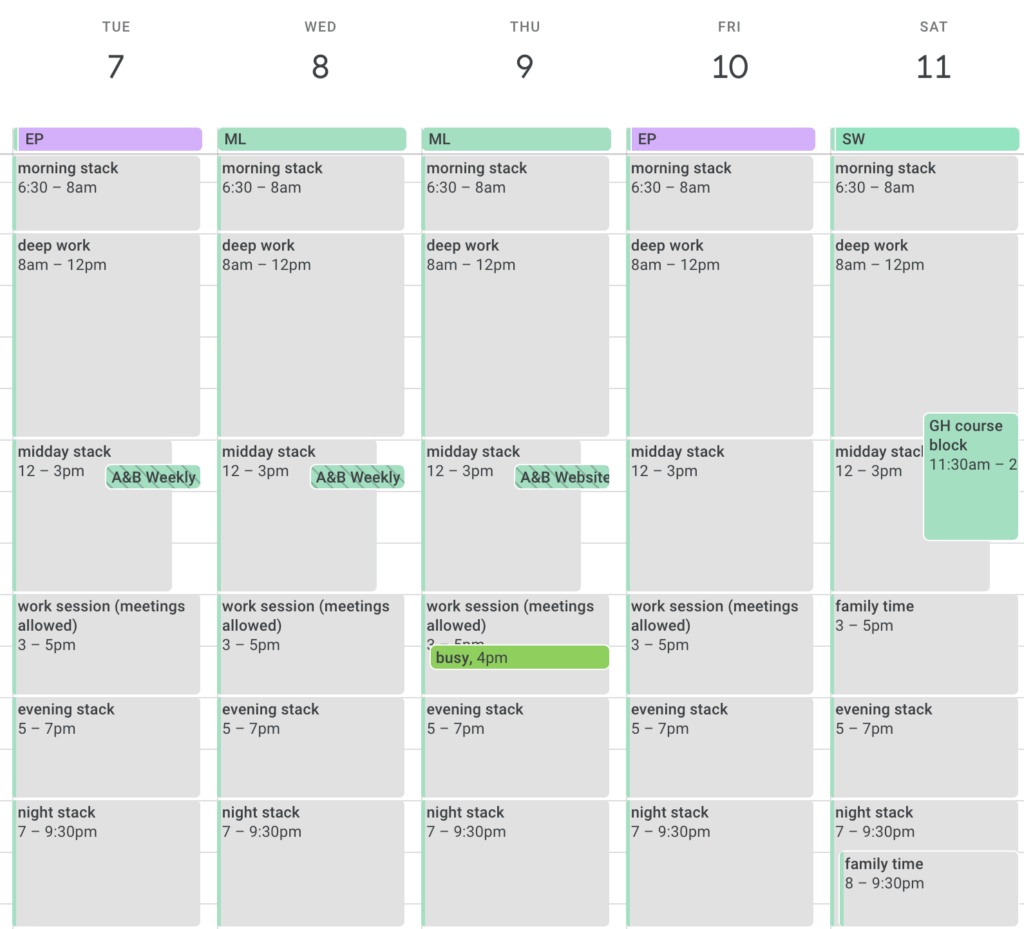In today’s fast-paced world, time management has become a critical aspect of our daily lives. From work and personal tasks to leisure activities, we all have a lot of demands on our time. The ability to effectively manage time is a valuable skill that can impact not only our productivity but also our overall quality of life. With proper time management, we can achieve more in less time, reduce stress and increase our satisfaction with life.
In this blog, we will delve into the top 10 time management strategies that are essential to improve your productivity.
By mastering these time management strategies, you’ll be able to gain control over your schedule, minimize distractions, and stay focused on your goals.
Planning
Planning is the foundation of effective time management. By taking the time to plan your tasks one day before, you can save valuable time in execution.
The key to successful planning is to do it in advance, ideally the night before, so that you can start your day with a clear and focused mind. This way, you avoid wasting time in the morning trying to figure out what you need to do, and can instead focus on executing your tasks with purpose.
Effective planning involves identifying your priorities and setting achievable goals for the day. It’s important to be realistic about the amount of time you have available and the tasks you need to complete.
By breaking down your tasks into manageable chunks and scheduling them into your day, you can ensure that you’re using your time effectively. Planning also allows you to anticipate and avoid potential roadblocks, giving you a clear path to follow for the day ahead.
You can use several tools to aid with planning your day or week. For example, ClickUp is a project management and productivity tool that helps with time management and planning by providing a centralized platform for organizing and tracking tasks.
With ClickUp, you can create and categorize tasks, set deadlines, and prioritize them based on their level of importance and urgency. This allows you to focus your time and attention on the most important and pressing tasks, ensuring that you are making the best use of your time.

Additionally, ClickUp provides a calendar view that allows you to see all your tasks and deadlines in a single, easy-to-understand format, making it easier to plan your time and avoid double-booking or over-committing. Furthermore, ClickUp offers features such as time tracking, which helps you monitor your progress and stay on track with your goals.
With all these features, ClickUp is a powerful tool for managing time and planning your workload more effectively.
Thus, planning is an essential step in effective time management. By taking the time to plan your tasks one day in advance, you can save time in execution, start your day with a clear mind, and focus on the tasks that matter most.
Deep Work
Deep work is a concept that refers to the state of complete focus and immersion in a task. It’s a time when you eliminate all distractions, including your phone and any other external interruptions, and concentrate solely on your most important tasks. This type of focused work has been shown to increase productivity and lead to better results in less time.
It’s easy to become overwhelmed by the constant barrage of distractions and interruptions. However, by embracing deep work, you can reclaim control over your time and focus on what really matters. This can involve scheduling blocks of uninterrupted time in your day specifically for deep work, or simply finding a quiet space where you can eliminate distractions and focus solely on your task at hand.

In order to be successful with deep work, it’s important to set clear goals and prioritize the tasks that require your full attention. This might mean avoiding social media, email, or other distractions during deep work periods. It’s also crucial to maintain consistency, by scheduling deep work regularly and making it a habit.
When implemented well, deep work is one of the most effective time management strategies you can use to boost productivity.
Eat The Frog
The concept of “eating the frog” refers to the idea of tackling your most important and challenging task first thing in the morning. This technique is based on the idea that if you start your day by accomplishing a difficult task, you’ll feel a sense of accomplishment and momentum that will carry you through the rest of the day.
By prioritising your most important tasks and doing them first thing in the morning, you can ensure that you’re making the most of your limited time and energy. This will help you avoid procrastination, as well as reduce the stress and anxiety that can come from having a long to-do list hanging over your head.
In order to effectively “eat the frog”, it’s important to plan in advance and set clear goals for the task at hand. You may also need to eliminate distractions and set aside a specific block of time for deep work. The key is to stay focused and persistent, even if the task is difficult or time-consuming.
Hence, “eating the frog” is one of the most powerful time management strategies that can help you prioritise your most important tasks, increase your productivity, and start your day with a sense of accomplishment.
Time Blocking
Time blocking is a time management technique that involves dividing your day into specific blocks of time, assigned to different tasks or activities. It’s a highly effective way to prioritise your most important tasks and ensure that you’re using your time effectively.
One of the key benefits of time blocking is that it helps you avoid multitasking and stay focused on one task at a time. By blocking out specific times on your calendar for different activities, you can avoid distractions and ensure that you’re making the most of your limited time and energy. This can include not just your biggest tasks, but also your most important ones, such as exercise, self-care, and leisure activities.

To make time blocking effective, it’s important to plan in advance and schedule your blocks of time on your calendar. This ensures that you’re intentional about how you’re using your time and prevents unexpected interruptions or distractions from disrupting your workflow. It’s also important to be flexible and adaptable, as life can often throw unexpected challenges your way.
Prioritisation
Prioritisation is the process of determining the order in which tasks should be completed based on their relative importance and urgency. To prioritise your tasks, you should categorize them into two groups: important and urgent.
Important tasks are those that have a significant impact on your long-term goals and objectives. These tasks should be given priority as they help you move closer to achieving your goals.
Urgent tasks, on the other hand, require immediate attention and have a deadline that cannot be missed. These tasks should also be prioritised as they often have a direct impact on your immediate goals and can negatively affect your progress if left unaddressed.
By prioritising your tasks in this manner, you can focus your time and attention on what is truly important and ensure that you are making the best use of your time.
Task Batching
Task batching is a time management technique that involves grouping similar tasks together and completing them in a batch. The idea behind task batching is to increase efficiency and productivity by reducing the time and energy spent switching between different types of tasks.
For example, instead of alternating between answering emails, writing a report, and attending a meeting, task batching would involve dedicating a specific block of time to answering emails, a separate block of time to writing the report, and another block of time to attending the meeting.
One of the key benefits of task batching is that it helps to reduce the time and energy spent on task switching. By grouping similar tasks together, you can focus your attention and energy on that specific task, reducing the time spent transitioning from one task to another. This can help increase your productivity and efficiency.
To effectively implement task batching, it’s important to identify and categorise your tasks into similar groups, such as administrative tasks, creative tasks, or communication tasks. You can then schedule specific blocks of time for each group of tasks, ensuring that you’re making the most of your time and energy.
80/20 Rule
The 80/20 rule, also known as the Pareto principle, states that roughly 80% of the effects come from 20% of the causes. In the context of time management, this means that 80% of your results come from 20% of your tasks.
By focusing on the top 20% of tasks that drive the majority of your results, you can prioritise your time and energy effectively, ensuring that you’re making the most of your limited resources. This can involve identifying and prioritising the most critical tasks on your to-do list, and dedicating the majority of your time and energy to these tasks.
By focusing your attention on the top 20% of tasks that drive 80% of your results, you can ensure that you’re using your time and energy effectively, and avoid spending time on low-impact tasks.
To effectively implement the 80/20 rule, it’s important to regularly assess and prioritise your tasks, ensuring that you’re focusing on the most impactful tasks. This can involve using tools such as the Eisenhower Matrix or setting clear goals to help guide your priorities.
Hence, the 80/20 rule is a powerful tool for effective time management. By focusing on the top 20% of tasks that drive 80% of your results, you can increase your productivity, avoid multitasking, and ensure that you’re using your time effectively.
Day Theming
Day theming is a time management technique that involves organizing your tasks into specific themes for each day. This helps you focus your energy and attention on specific types of tasks and achieve more in less time.
For example, you can theme your Monday as a “meeting day” and schedule all your meetings and calls for that day. Similarly, you can theme your Tuesday as a “writing day” and dedicate the day to writing scripts, creating content, or completing any other writing-related tasks.
By theming your days, you can streamline your work and increase your productivity. You are also less likely to get bogged down by the sheer number of tasks you have to complete and can instead focus on one specific theme at a time.
If you run multiple businesses, day theming can be especially useful. You can theme each day to focus on a specific business, allowing you to give each business the attention it needs. This helps you balance your workload and avoid getting overwhelmed.
SOPs
Standard Operating Procedures (SOPs) is a time management technique that involves documenting the tasks and processes you perform or repeat on a day-to-day basis. By creating SOPs, you can create a step-by-step guide for yourself and others on how to perform a task, reducing the time and effort spent on training and communication.
Having SOPs in place allows you to delegate tasks to others with ease and confidence, knowing that they have clear instructions on how to complete the task. This can free up your time to focus on more important tasks that align with your skills and expertise.
Additionally, SOPs can also help you ensure consistency in your work processes, reducing errors and improving the overall quality of your work.
Creating SOPs can help you improve your time management by reducing the time and effort spent on training and communication, freeing up your time to focus on higher-value tasks, and ensuring consistency in your work processes.
By documenting the tasks and processes you perform on a day-to-day basis, you can assign those tasks to others and improve your productivity, reduce your stress, and better manage your time.
Outsourcing
Outsourcing and delegation are key time management strategies that allow you to focus on tasks that are the most important and impactful for your business or personal goals. The concept behind outsourcing and delegation is to delegate tasks that fall below your hourly rate to others who can perform the task more efficiently and effectively.
For example, if you’re an entrepreneur who charges $100 per hour for your services, it may not make sense to spend time on tasks like data entry, scheduling, or administrative tasks that can be done by others for less. By outsourcing these tasks, you can free up your time to focus on higher-value tasks that are aligned with your skills and expertise.
See also: 5 Profitable Income Streams In Digital Marketing
Additionally, outsourcing can also help you access a wider pool of talent and expertise, allowing you to get tasks done more efficiently and effectively. This can be especially useful if you’re working on a complex project or if you’re looking to expand your business.
You can use tools like Upwork to outsource tasks. Upwork allows you access to a pool of skilled freelancers from around the world, saving time and resources on hiring and training in-house employees.

Thus, outsourcing and delegation can help you improve your time management by freeing up your time to focus on higher-value tasks, accessing a wider pool of talent and expertise, and improving the efficiency and effectiveness of your work. By identifying tasks that fall below your hourly rate and outsourcing them, you can improve your productivity, reduce your stress, and better manage your time.
In addition to the 10 time management strategies outlined in this blog, here’s a bonus tip to help you improve your time management skills!
Track Your Time
Tracking your time is a key aspect of effective time management. By using a web time tracker such as the one on Chrome, you can gain insight into how you are spending your time and identify areas where you can improve your efficiency. This information can then be used to implement effective time management strategies.
A web time tracker works by monitoring your activity on the web and tracking the amount of time you spend on each website or application. This information can then be displayed in a graphical or tabular format, allowing you to see exactly where your time is being spent.
By tracking your time, you can identify patterns and habits that are hindering your productivity. For example, you may realize that you are spending too much time on social media or that you are frequently distracted by email notifications. With this information, you can implement time management strategies to limit your time on these distractions and focus on more important tasks.
In addition to tracking your time, you can also use a web time tracker to set goals and establish routines. For example, you can set a goal to limit your time on social media to 30 minutes a day and use the tracker to monitor your progress.
In conclusion, time management is a crucial aspect of our daily lives that can significantly impact our productivity and overall satisfaction with life. By incorporating the top 10 time management strategies outlined in this blog, you can improve your efficiency, reduce stress, and achieve more in less time. Whether you’re a busy professional, student, or just looking to streamline your daily routine, these time management tips and techniques will help you stay organized, prioritise tasks, and maximise your time.
Remember, implementing time management techniques effectively requires discipline and a commitment to making changes in your daily routine. Take the time to evaluate your current habits and identify areas where you can improve. With persistence and practice, you’ll soon see the benefits of using time management strategies in your increased productivity and overall quality of life.



